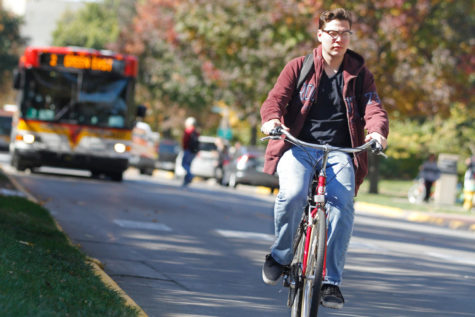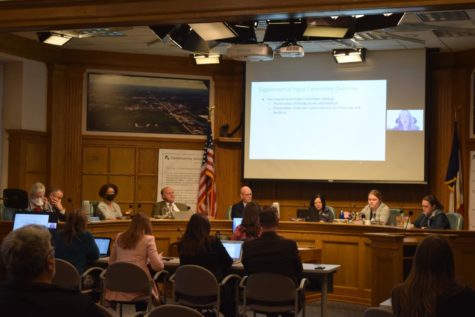The importance of the Dalai Lama
May 17, 2010
Regarded as one of the most influential leaders of today, The Dalai Lama has traveled to over 63 counties over 6 contents, received more than 84 awards, including the Nobel peace prize, all by the age of 74.
The Dalai Lama will speak at UNI Tuesday. In 1994 UNI began working with the Tibet Fund to help provide scholarships for Tibetan students to study at UNI. UNI president, invited the Dalai Lama to lecture on education and the value of learning.
The current Dalai Lama was born in Taktser Amdo in northeastern Tibet. At the age of 2, he is assumed to be the incarnation of the previous 13 dalai lamas.
The dalai lamas are believed to be manifestations of Avalokiteshvara or Chenrezig, the Bodhisattva of Compassion and patron saint of Tibet. Bodhisattvas are enlightened beings who have postponed their own nirvana and chosen to take rebirth in order to serve humanity.
The Dalai Lama was chosen by a search team appointed by the Tibetan government, who followed clues that they believed would guided them to the current Dalai Lama’s home. Once reaching the young Dalai Lama’s home, the group spent the night with his family, but did not say why they were doing in the town.
The young Dalai Lama recognized the leader of the party as a spiritual leader, rather than the servant that he was posing as. The Dalai Lama then later recognized several items belonging to the 13th Dalai Lama as his own. This convinced the party that he was the new incarnation.
“No one had any idea that I might be anything other than an ordinary baby … certainly my parents had no idea that I would be proclaimed Dalai Lama.” said the Dalai Lama.
At the age of 15, he assumed full political leadership. He gained political leadership in 1950 after China’s invasion of Tibet in 1949. In 1954 he went to Beijing for peace talks with Mao Zedong, among other leaders.
In 1959, he was forced into exile due to increasing tensions between Tibet and China. Since then he has been living in Dharamsala in northern India.
In his old age, he has left the leadership role of the Tibet movement and became an exiled elected parliament leader. He still advocates for Tibet’s case.
“For those of us in exile, I said that our priority must be resettlement and the continuity of our cultural traditions. As to the future, I stated my belief that, with truth, justice and courage as our weapons, we Tibetans would eventually prevail in regaining freedom for Tibet,” the Dalai Lama said.
The Dalai Lama was awarded the Nobel peace prize for his nonviolent struggle for the liberation of Tibet in 1989. He was also the first Nobel Prize laureate to be recognized for his concern for environment problems.
His life is guided by three major commitments: the promotion of basic human values or secular ethics in the interest of human happiness; the fostering of inter-religious harmony; and the welfare of the Tibetan people, focusing on the survival of their identity, culture and religion, according to the official website of the Dalai Lama.
“We all want happiness and do not want suffering. Even people who do not believe in religion recognize the importance of these human values in making their life happier,” the Dalai Lama said.
The Dalai Lama speaks not only on Buddist teachings, and of the independence of Tibet, but on global issues such as religious harmony, compassion and world peace.
The pannel discussion
WHAT: About 500 to 700 tickets remain for a panel discussion with the Dalai Lama on “Educating for a Nonviolent World.”
WHEN: 9:30 – 11 a.m. Tuesday, McLeod Center, UNI. Doors open at 8:15 a.m. and close at 9:15 a.m.
TICKETS: Available at all UNItix locations, by phone at 319-273-4849, or online at www.unitix.uni.edu. Cost: $15, plus a $2-per-ticket handling charge. All seating is reserved.
QUESTIONS: The public is invited to submit questions for the Dalai Lama related to both the panel discussion topic, “Educating for a Nonviolent World,” and a sold-out keynote address, “The Power of Education,” from 2 – 3:30 p.m.
















